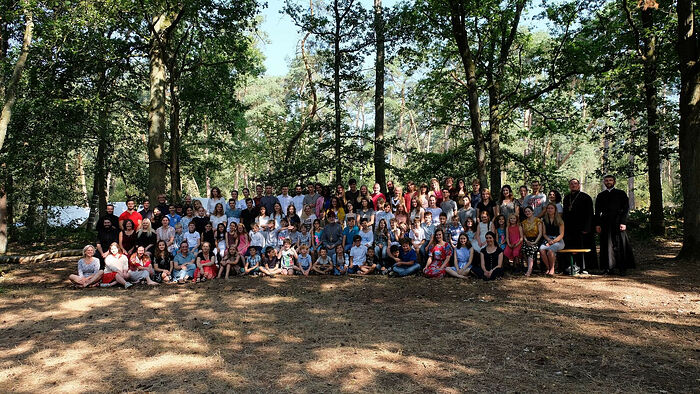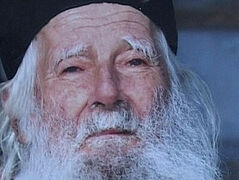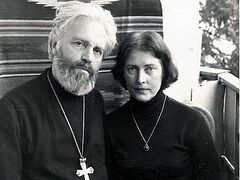A priest who is also a truck driver is not something you come across often. Fr. Alexander Yavorovsky combines the tough job of a truck driver for the Hödlmayr logistics company with his duties as rector of the Church of the Holy Apostle and Evangelist Mathew in the city of Leuven as one of the clergymen of the Archbishopric of Brussels and Belgium of the Russian Orthodox Church. Our engaging talk with Fr. Alexander covered topics as varied as how a broken jaw helped him become a priest, what it is like to be ordained at the age of just twenty-one, his truck driver training course and the relationship with other truckers, continuing his ministry while at the wheel of his rig, his multi-cultural parish, the Orthodox children’s camp in Belgium, why Europeans fear death, the deserted Catholic churches in Europe, government assistance and the gift of the priesthood.
—Orthodox Christianity is not considered a traditional religion of Belgium. Could you tell our readers about the history of the first local Orthodox communities? How were they founded and how many parishes are there, both in the Moscow Patriarchate and other local Orthodox Churches?
—Interestingly, Belgium, as an independent state, was founded relatively recently. It was formed as a result of the Belgian revolution in the 1830s. Leopold, a military leader at the time, was crowned its first king. Leopold had served under Emperor Alexander I, spoke Russian, and was in charge of a Russian military unit during the war with Napoleon before he was crowned king. But the Russian Church arrived in Belgium with the opening of the Russian embassy. In 1862, the St. Nicholas Chapel was consecrated on the embassy premises.
The lion’s share of the local parishes was founded after the White Army’s exodus from Crimea in the 1920s, however. That’s when, due to a large wave of Russian émigrés, the first communities emerged. In 1929, the first Bishop Alexander (Nemolovsky) was consecrated and became the head of the local Archbishopric of the Russian Orthodox Church. Presently, there are quite a few Orthodox Christians in Belgium. If there were about 80,000 of us in 2010, now it is almost 100,000 thanks to a large influx of the faithful from Romania and Ukraine.
There are currently fifteen Russian parishes, including two monasteries. Constantinople has about 30 parishes, the Romanians have 13, and then there are a few Georgian, Serbian and Bulgarian parishes.
—Please tell us about your parish where you are rector. Where is it located and who is its patron saint? Who are your parishioners?
—I serve in the city of Leuven, and our parish was founded on November 29, 2003, when the first liturgy service was held on the feast of the Holy Apostle Matthew. Our archpastor, His Grace Bishop Simon (Ishunin), decided to dedicate the church to St. Matthew. It was the third attempt to open a church in this city. The first attempt was in 1922 but it didn’t take root, just as the more recent community, founded after the war, died off by the 1970s as well. I only became rector a year after the church was founded. I barely spoke Dutch at the time, while this church had local Orthodox Belgians among its founders.
We have people from many countries and cities, from Russia to America and Australia. Leuven is a university town, so we have many students among our parishioners.
—In what language do you conduct the services and preach?
—It is generally done in two languages, Church Slavonic and Dutch. We serve in both languages, as we switch in between when saying different prayers or singing different hymns. The Creed, the Lord’s Prayer, the readings from the Book of the Apostles and the Gospels, as well as my sermon, are translated by an interpreter. Sometimes, we use English for our American parishioners and those students who speak neither Russian nor Dutch.
—If you compare your current parish with Orthodox communities in Russia or Belarus, what obvious differences are there? How involved are the parishioners in the church activities outside of services? How can you characterize their participation in and responsibility for the church, in supporting the clergy? Do they take part in making decisions important for the well-being of their parish?
—There are no traditional Orthodox church buildings in Belgium per se, and their absence is striking. There is only one in Brussels, a memorial church built during the first wave of the White Russian emigration. The rest of the Belgian parishes have to rent out the worship space. In the majority of cases, they rent the abandoned buildings left empty after the dissolution of Catholic parishes. In our case, we rent a church of a former Catholic theological seminary. Of course, we upgraded the space according to our liking, added an iconostasis and hung the icons, but externally, it retains an obviously un-Orthodox style.
Another point. We don’t leave church right after the service is over, but we stay for tea in a large hall adjacent to the church. We invite all our visitors to join us. I think it is great! I strictly abide by the idea that no one who comes to church should spend this precious time on idle and empty talk. I feel it is very important that we get in the right mood once we get to church and keep it this way while there. That’s why, during our teatime, we hold the catechism lectures in two languages. Sometimes, we also invite guest speakers.
Our parish does not charge anything for the religious rites, literature, or church items. Vladyka appointed me to serve in this church in 2004 and I have had to build it from scratch. So, from the day of its founding, I have strived to grow it the way I wanted it to be. I know that back in Russia we have to do things differently. But I had an excuse, “I earn a living at my secular job. It means that, at my church, everything will be free of charge.” My seminary education was free of charge, therefore, I have to give back what I learned for free, as well.
We have translators among our parishioners who help other parish members to understand the words of prayers or sermons. Since Orthodoxy in Belgium is an official religion, there are children who are willing to study the Law of God at school. We have some folks among the parishioners who teach this subject during the week. We take regular trips as a parish. We rent a large cabin in the mountains accommodating 40 to 50 people and stay there for a weekend, and that’s where I also serve a liturgy. Sometimes we travel to a monastery and stay there for a few days. Additionally, since I am the organizer of the summer youth camp, I also get my parishioners involved in this work.
We have two parish councils. One of them is an official group, as the parish has a status of an officially registered congregation, so it is our council of representatives. Another one is the church council dealing with the daily life of the congregation—it is responsible for making decisions on behalf of the parish.
—Fr. Hildo Bos, who we spoke to recently, mentioned that you helped him organize the Orthodox children’s camp in Belgium. Is this true? Please tell us more about this project, the participants, its program and, more importantly, how do you find the time given how busy you are?
Back in 2005, the youth groups from Belgium and Holland invited me to participate as a chaplain at their annual youth camp. It so happened that the priest they usually invited was sick and they needed someone in his place. Since my childhood was really busy, and I spent a lot of time at pioneer camps1 that I thoroughly enjoyed, so I agreed. Since then, I have been serving as the camp’s priest every year, and have also become one of its organizers.
The camp is always held in summer. We invite children aged between 7 and 18. We usually get about 50-60 people from Belgium and Holland. The two main requirements are that a child speaks Dutch and belongs to the Orthodox Church. For every camp, we select a particular topic relating to the Holy Scripture, Church history or spiritual life to work on. We have a whole year to prepare the materials for our camp’s theme and we get to explore it in depth during a week of camping. We set up our tents with one tent serving as our chapel. The camp is always laid out in the woods.
I am not the only camp organizer. I must say that this camp is run professionally, we pay great attention even to minute details, and our youth leaders are selected according to the appropriate age groups. We start our camp day with prayer at the chapel under the tent. During the first part of the day, we play games and hold conversations relating to various catechism questions. We stage shows and make crafts that help children gain an in-depth knowledge of the general theme. Older participants go on two-day hiking trips. At the end of the week, all children have an opportunity to have confession and receive Communion at the Divine Liturgy held in our tent church.
—Do native Belgians often get baptized or convert to Orthodoxy in your parish?
—We regularly baptize new members. However, I do follow a rule by the Apostle Paul he laid out in the Epistle to his disciple Timothy: Lay hands suddenly on no man (1 Tim. 5:22). In our parish, a catechumen must put in an effort before becoming Orthodox or getting baptized.
—Why?
—I am very sensitive about these things. As for conversion to Orthodoxy… If someone asks me about joining the Church, I teach him or her about our faith in great detail. I explain that becoming Orthodox is not about wearing a cross or occasional church visits. It means changing your way of thinking and your spiritual life. It takes time to prepare for it. I suggest that they attend church services and take a closer look at the way we live and pray. I tell them that I will explain the meaning of spiritual life and then they can decide whether Orthodoxy is for them or not. It usually takes the person about six months to a year to make the decision. As a result, I have full confidence in those who stay and become Orthodox. I know that they will come to church and put in an effort to live according to the spirit of our faith.
—Can you think of any memorable or unusual conversion stories?
—Absolutely! We had a lady who used to attend church with her husband. He even sometimes joined us on our church trips. All of a sudden, he asked me, “I would like to become Orthodox.” After lengthy preparation, he became Orthodox. Moreover, he later entered the local Orthodox theological institute that offers training courses for those who teach the Orthodox faith in schools. Upon completing the course, he became a teacher. Later on, he started helping me during services, first as a reader, but now he is an ordained deacon, Fr. Dn. Stefaan Devroey.
—Conversions like this don’t cause conflict in Belgian families, do they? What can you say about the status of interfaith relationships in this country?
—No, conversions don’t cause conflicts, because a catechumen has enough time on his hands to decide how deeply he can be involved in church life. What stands at the root of such conflicts? More than likely, it is about frequent church visits or active participation in the life of the parish.
As for interfaith dialogue…. It speaks for itself that, since we use former Catholic churches as the places of worship, we have good working relationships with the Roman Catholic Church. They accommodate our requests and help us find space to conduct services. I’d say we are on friendly terms with them.
—It is not the first time I have spoken to priests serving in Europe who say that Catholics offer space to have services, and in some other countries, it’s Protestants who offer. It all works smoothly, without problems or conflicts. The question that arises is—what’s in it for them?
—Given that the Catholic Church in Belgium is in a state of decline, their churches are standing empty, their senior priests die while there are no young ones to replace them, the Catholics are even forced to invite clergy from Africa to serve here. There is this awful rule in the Roman Catholic Church by which they can perform a particular rite, and then declare that a particular building is no longer a church. It means they can easily rent or sell it. We can see how the Catholic church buildings in Belgium are turned into hotels, libraries, shops, or skate parks for the local youth. Of course, they are more inclined to preserve their former churches as places of worship.
—Based on this story, it sounds like we do have reason to speak of the de-Christianization of Europe, or that the Catholic Church is disappearing from Belgian life.
—Unfortunately, it’s true. Here is my take on this: The blame for these problems lies on the priests themselves and mistakes of their pastorship, because when church holidays and the spiritual life disappear, there is no one left to look up to or get inspiration from. When I had just come to this country, I was very surprised by what I saw. You possibly know that Catholics perform the rite of confession in special confessional booths with two entrances, one for the priest and another for the faithful. But today, these booths serve as mini-storage rooms to keep all kinds of stuff. What does this mean? The confessionals are no longer in use. If there is no Confession, the spiritual life withers away, the previous generation dies, the young people have no example to follow, so the parishes become deserted and eventually disappear.
There is also another aspect of this problem. Since religion classes in Belgian schools are denominational, the child, regardless of the school, can usually choose whether to go to a Catholic, Protestant or Orthodox teacher. My children don’t have this choice at their school, however, and their teacher is a Catholic. You can’t even imagine how many evenings I have heard my kids complain about the mockery and blasphemy their teacher says in his lessons, “Children, you do understand that everything I am telling you is simply fairytales, right?” What will become of these kids if their school teacher presents the Law of God in such a light?
—Why does it happen?
—You know, where your treasure is, there will your heart be also (Matthew 6:21). Tragically, the heart of Western man is mostly disposed to earthly cares. Their faith in God has disappeared, along with the belief in the existence of life after death. They are terrified of anything that has to do with funerals and the deceased. God forbid if they see a funeral procession! The open casket can’t be carried outside. The topic of death is practically taboo here. All their attention is focused on this transient life on earth. “Take all you can from this life” is the appeal heard here all the time.
I can offer a comparison example from my life as a professional trucker. Imagine that twenty times a day, a billboard with, “Live life as you wish!” written on it passes you by. The logo of the Delhaize retailer is shown, followed by a blank space and then the slogan I mentioned. If you see this motto flash before your eyes 20 times a day, by the end of the day, you agree with it.
Here is another example. A woman buys French L’Oréal cosmetics and their advertisements repeat, “You are worth it!” When you hear it over and over, you gradually begin to agree that since you are worthy of all these comforts, you must enjoy life to the fullest, the more the better, life is so short after all… In this way, God goes by the wayside and is then pushed even further aside. Next, the voice of the conscience goes quiet and God dies in the heart of man.
—The government, as far as I know, even provides financial support to the Orthodox parishes. Is this true?
—Right, there is state support. There are several denominations the Belgian state considers as officially recognized faiths. I will try to count them all: Catholics, Protestants, Orthodox, Muslims and Jews. The state offers official support to those parishes that receive the official state registration. In order to get registered, it is necessary to fulfill certain conditions. The parish should be known as belonging to one of the officially recognized denominations, it should consist of a particular number of parishioners, have a legal address, and it can’t share its premises with any other registered parish.
The parish also has the right to receive subsidies. They are paid annually based on the application by the official parish council I have mentioned before. This council is called the “kerkfabriek” which means the “church factory.” It consists of five people who represent the interests of their parish in all dealings with the state. They have the right to inquire about the financial support that can be allotted to cover the cost of rent of premises, the purchase of new vestments, utensils or furniture. By the way, the Russian Orthodox Church was recognized as a representative of an official state religion in 1985.
—Interestingly, though, the Orthodox parishes are represented in all their dealings with the Belgian state by the Bishop of the Patriarchate of Constantinople. Taking recent events into account, does it ever affect the life of the communities that belong to the Russian Church when they have to deal with the state?
—No. On the archpastoral level, it has not affected our relationships. Metropolitan Athenagoras (Peckstadt), who represents all Orthodox Christians before the Belgian authorities, enjoys a good working relationship with our Archbishop Simon. Under no circumstances has the current conflict in world Orthodoxy ever affected our personal relationships.
At the same time, regular people did feel the effect of it. I have friends who are priests in the Patriarchate of Constantinople. We can no longer visit each other and concelebrate services as before. The same goes for our flock.
How to minister to a parish under pandemic conditions
—How did your parish survive the “viral” year of 2020?
—During the first wave of infections, we couldn’t hold services at all for two months. This was at the same time when we were strictly prohibited even from leaving our homes. I took a risk and served the liturgy a few times behind closed doors for a small number of parishioners. I did administer the Holy Gifts to people in their homes, where we had a gathering of a few people, as well.
During the second wave of infections, there were some easings of certain restrictions. We were allowed to have gatherings in the church at first as a group of four, which was later increased to a maximum of fifteen people. Of course, I wasn’t happy about it. What do those fifteen people amount to? It’s me, the deacon, the sacristan, the reader, and three or four parishioners. So, does that mean I can only invite seven other people to attend the liturgy? That’s why I decided to do the following: I would serve the liturgy behind closed doors once a month, where I prepared the reserved Holy Gifts. Then, the next week, I would ask people to sign up as participants in the Holy Mysteries. Next, on Sundays, we let our parishioners enter the church in small groups according to an arranged schedule. They have the opportunity to confess. I serve something like a short Typicon service and commune them with the reserved Gifts. Afterward, I would say a short homily and let them go. It repeats with the next group. This way, I can give the Communion to 30 or 40 people on a Sunday. I think of it as being more beneficial than if I had only served for a small number of people.
—What kind of lessons did you learn as a priest from this challenging situation?
—As I mentioned earlier, a priest, no matter where he is—in his church, at home, or riding a truck—must always remain a priest. This thought should always pervade your mind. I think the same can be said about anyone else who has the honor of being called a Christian. We must always remain Christians. Even during pandemics. I repeat it often: there is no need to panic. We have to take it in stride. This is a God-pleasing time that helps us to take a detached view of ourselves. “Who am I, without my church, when there is no church on Sundays? How can I use my free time when I am forced to stay inside my house?” I am speaking first and foremost about myself. That time brought great joy to my family! Before the pandemic, the only time they could see me at home was during a week of summer vacation. But now their dad stayed home with them for two months! He cooks breakfast, does morning exercises with them, plays board games and watches movies with them… A miracle! But I encountered a problem. My well-organized daily routine I used to have while working was gone. Aha, it turns out I can’t use the free time very well! I had to concentrate my attention on this problem by taking a closer look at my daily schedule so that I wouldn’t waste my day.
As for conclusions, I will have to speak my mind, even though I am going to be chastised for it. During the pandemic, I saw how our Church has grown used to a very wasteful and, in my opinion, dangerous tradition of live-streaming Divine Liturgy services via Youtube or other channels. I will explain myself. I think that it is possible to live-stream Vespers or a prayer service, but never a Liturgy. I think that the Liturgy is Divine Action, where man is to take part in person. While taking part sitting in front of the TV or a computer, even if standing… you are deprived of being a partaker of the Mystery of the Holy Eucharist. You are called to come to church not to stand through the service, but to take part, not only by praying, but being a communicant.
—What places would you recommend someone travelling to Belgium?
—Some tourists enjoy the populous Belgian towns with their narrow streets and odd-looking houses. I am not one of them. I am a countryman and I live in a village, because I enjoy peace and quiet. That’s why I simply can’t say, “Visit Bruges,” or “come to Antwerp!” The nature in Belgium is stunning. Come visit the Belgian Ardennes where you can live one-on-one with nature.
—Thank you so much for this wonderful conversation. Father Alexander, in conclusion, I will ask our traditional question: What words from Holy Scripture, do you find particularly inspiring, that have supported you during difficult moments in your life?
—For where your treasure is, there will your heart be also (Matthew 6:21).








